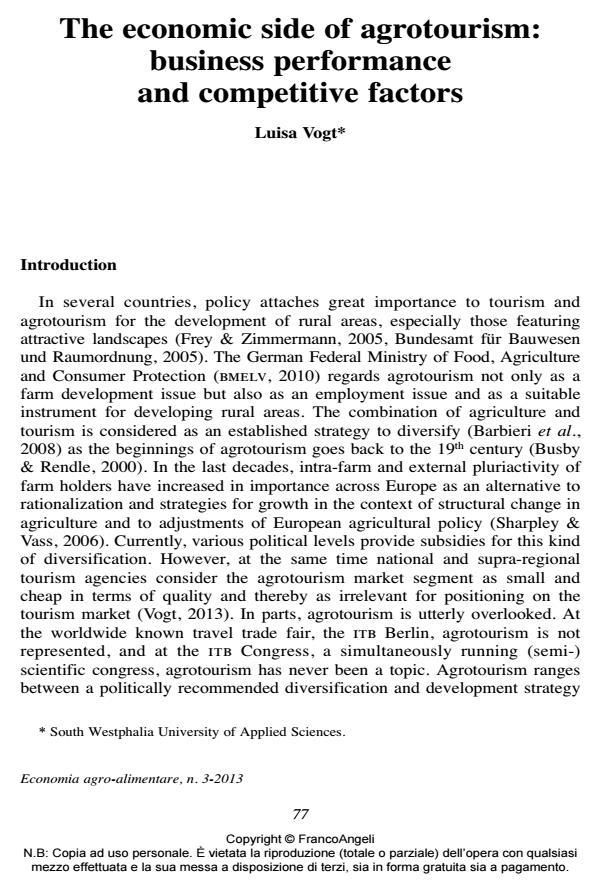The economic side of agrotourism: business performance and competitive factors
Titolo Rivista ECONOMIA AGRO-ALIMENTARE
Autori/Curatori Luisa Vogt
Anno di pubblicazione 2014 Fascicolo 2013/3
Lingua Inglese Numero pagine 26 P. 77-102 Dimensione file 928 KB
DOI 10.3280/ECAG2013-003006
Il DOI è il codice a barre della proprietà intellettuale: per saperne di più
clicca qui
Qui sotto puoi vedere in anteprima la prima pagina di questo articolo.
Se questo articolo ti interessa, lo puoi acquistare (e scaricare in formato pdf) seguendo le facili indicazioni per acquistare il download credit. Acquista Download Credits per scaricare questo Articolo in formato PDF

FrancoAngeli è membro della Publishers International Linking Association, Inc (PILA), associazione indipendente e non profit per facilitare (attraverso i servizi tecnologici implementati da CrossRef.org) l’accesso degli studiosi ai contenuti digitali nelle pubblicazioni professionali e scientifiche.
Agrotourism is often numbered among the promising diversification strategies in agriculture. At the same time, the competitive situation and performance drivers are quite unknown. Research often concentrates on the reasons for the decision for this form of diversification or the drivers of agrotourism development in general. Surveys on the impact of different (potential) driving factors on the business performance of agrotourism firms are lacking to a large extent. Based upon a case study in North Rhine-Westphalia (ger) the present study focuses this gap and aims at measuring the competitive situation at firm level and at explaining the business performance via different internal and external factors (n = 48). So, it could be shown that agrotourism is quite a competitive market segment. Significant and most important drivers of performance are investments in the past 20 years, presence and implementation of strategic management such as regular target monitoring and the adaptation of supply to specific target groups, furthermore marketing expressed in the annual marketing budget and in the use of quality marks. In addition, the quality of operations, the relative location to core resources and the active participation in networks foster business performance. Interestingly (and in contrast to hypotheses in literature), motivations of business owners have no bearing with performance issues. Moreover, typical governmental acts such as subsidies or building law restrictions neither foster nor hamper the competitive situation at a significant level. Thus, policy implications of this study in particular relate to a promotion of individual resources, especially management skills, of business owners. Research desiderata mainly refer to a larger sample size.
Parole chiave:Agrotourism, business performance, competitive factors, case study
Jel codes:L8, R11, Q13
- Farm tourism as a driving force for socioeconomic development: a benefits viewpoint from Iran Mohammad Nematpour, Masood Khodadadi, in Current Issues in Tourism /2021 pp.247
DOI: 10.1080/13683500.2020.1711712 - The future of Alpine pastures – Agricultural or tourism development? Experiences from the German Alps Alice Wanner, Ulrike Pröbstl-Haider, Magdalena Feilhammer, in Journal of Outdoor Recreation and Tourism 100405/2021 pp.100405
DOI: 10.1016/j.jort.2021.100405 - Recreational Services Provision and Farm Diversification: A Technical Efficiency Analysis on Italian Agritourism Brunella Arru, Roberto Furesi, Fabio A. Madau, Pietro Pulina, in Agriculture /2019 pp.42
DOI: 10.3390/agriculture9020042 - Competitiveness of diversification strategies in agricultural dairy farms: Empirical findings for rural regions in Switzerland Andreas Hochuli, Janina Hochuli, Dierk Schmid, in Journal of Rural Studies /2021 pp.98
DOI: 10.1016/j.jrurstud.2021.01.021
Luisa Vogt, The economic side of agrotourism: business performance and competitive factors in "ECONOMIA AGRO-ALIMENTARE" 3/2013, pp 77-102, DOI: 10.3280/ECAG2013-003006